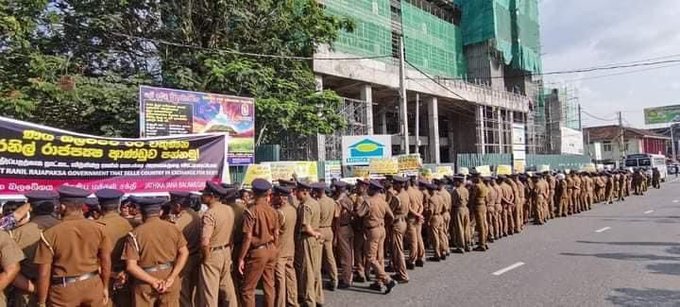BY Saman Gunadasa.
The International Monetary Fund (IMF) has demanded that the Sri Lankan government restructure domestic debt as the next step in its brutal austerity program. This means the government must arrange with domestic creditors to restructure their loans so as to reduce the government’s debt burden.
According to the Central Bank, Sri Lanka’s domestic debt is around 15 trillion rupees ($US47 billion), with foreign debt totaling 12.5 trillion rupees. The major domestic lenders to the government are private and public banks (8.5 trillion rupees) with the remainder from non-banking sources.
The Employee Provident Fund
The Employee Provident Fund (EPF), which is one of these non-banking sources, is the country’s main superannuation fund. It has invested around 95 percent of its 3.5 trillion-rupee fund in government securities.
Domestic debt restructuring will have a detrimental impact on workers’ savings. Apart from retired government employees, who are eligible for a monthly pension, the majority of retirees in Sri Lanka deposit their pension funds in commercial banks and live on the interest payments. Private sector and state enterprise workers accumulate their pensions in the EPF with statutory contributions from employers and employees.
Opposition Samagi Jana Balawegaya (SJB) MP Harsha de Silva told parliament on May 9 that the total US dollar value of the EPF had fallen to $9.5 billion in 2022—down from $15.8 billion at the end of 2021—due to devaluation of the rupee and the negative real interest rate paid per annum.
The main domestic lenders to the Sri Lankan government are the state banks, regarded by working people as the most reliable and stable financial institutions. These banks, including the Bank of Ceylon, the People’s Bank and the National Savings Bank, have lent to the government by buying treasury bills and bonds.
Krishna Srinivasan’s warning
IMF Asia and Pacific Department Director Krishna Srinivasan told a Hong Kong press briefing last week that the Wickremesinghe government had accepted the IMF’s demands for domestic debt restructuring prior to last month’s official approval of a $US3 billion bailout loan. The government is expected to present a comprehensive debt-restructuring framework this month.
Krishna Srinivasan bluntly declared, “When you restructure domestic debt, you have to make sure that you also safeguard financial stability… debt sustainability is quite a big challenge in Sri Lanka.”
Domestic debt restructuring has triggered worried statements from the corporate sector and other sections of the capitalist class, which are concerned about its impact on their assets. This nervousness is reflected in comments from the parliamentary opposition parties, such as the SJB, which have warned the government that it must safeguard the stability of the banking system.
While Sri Lanka’s corporate banks have reaped exorbitant profits during the country’s unprecedented financial collapse, consecutive Colombo governments have imposed the burden of this crisis on working people who have endured untold suffering.
Bank profits unchanged
Following the onset of the coronavirus pandemic, the Central Bank provided hundreds of billions of rupees to the corporate banks, which made loans to big business at cut price interest rates.
According to the Central Bank, after-tax profits for the banking industry in 2021 were 172 billion rupees and in 2022, at the height of the economic crisis, over 150 billion rupees. Private banks also reaped the rewards. The Hatton National Bank and Sampath Bank made 15 billion and 13 billion rupees respectively in net profit in 2022.
Attempting to alleviate concerns about the ongoing profitability of the banking sector, the Central Bank has assured local bankers that their profits will be protected from any adverse impact of domestic debt restructuring.
Addressing a public forum on Tuesday, Central Bank Governor Nandalal Weerasinghe declared: “In any kind of debt optimisation, we will ensure and safeguard banking system stability, as well as the protection of public deposits.”
Notwithstanding Weerasinghe’s claims that the Central Bank will protect “public deposits,” the governor’s real concern is the profits of the banking industry, not the depositors of pension funds and smaller savings. There is a real danger that workers’ life savings will be used by the government to restructure and reduce its domestic debt.
Do not touch Banking capital
In other words, the IMF’s demands for domestic debt restructuring without impacting on the banking capital of big business could be realised by exploiting workers’ pension funds. This would be another component of the “brutal experiment,” previously referred to by Peter Breuer, the IMF’s mission chief for Sri Lanka.
When the Wickremesinghe government and all the opposition parliamentary parties declared that there was no other alternative to IMF austerity, they not only endorsed all the social attacks now being unleashed against working people. They also committed not to “destabilise” corporate profits.
Excerpts from longer article published in WSWS
